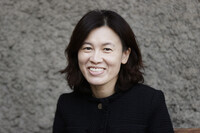hankyoreh
Links to other country sites 다른 나라 사이트 링크
[Column] S. Korea’s foreign policy dilemma can’t be solved with black-and-white thinking


By Park Min-hee, editorial writer
South Korea faces one of the greatest challenges in the world today in terms of crafting its foreign policy. During the 30 years since Seoul and Beijing established diplomatic ties, South Korea’s foreign policy framework has been one of relying on the US for security and on China for economic matters while working with both sides to deal with the North Korean nuclear issue.
But as the world is fragmented by the hegemonic rivalry between the US and China and now Russia’s invasion of Ukraine, that framework has fallen apart. South Korea is too dependent on China for economic matters when the economy is interlinked with national security, and North Korea’s nuclear threat is growing even more perilous. There’s probably no easy way to resolve those challenges.
More than ever before, Korea needs a leader who can speak and act with prudence, cooperating with the international community and responding aggressively to a changing world without being forced to man the front lines of the encirclement of China.
In an interview with the Washington Post published on April 14, Yoon said that South Korea needs to bolster its military alliance with the US to gain a stronger political position vis-a-vis China. “China has an alliance with North Korea,” Yoon remarked while calling North Korea “the main enemy.”
Yoon’s remarks could be taken to mean that China, as an ally of North Korea, is also the main enemy. That’s far too categorical of a statement for a president-elect to make. He’s drawing upon the grammar of a prosecutor — innocent and guilty, black and white.
Yoon hasn’t properly gauged the weight of foreign policy and national security. He has degraded grave issues such as a preemptive strike against North Korea and deploying more batteries of the THAAD missile defense system into political fodder for attacking the outgoing president.
“If Yoon conducts foreign policy with the language and behavior he’s used thus far, a major crisis will erupt within a year,” said one worried foreign policy expert.
I’m worried about whether Yoon will be able to properly distinguish between the national interests of South Korea and the US in his summit with US President Joe Biden on May 21. That’s right around the corner, just 11 days after his inauguration.
If the dichotomous approach of Yoon, who represents the conservative camp, prompts concern, it should be noted that the progressive camp has its own kind of black-and-white approach. It’s exhibited by those who blame NATO’s eastward expansion and the US’ disregard for Russia’s security concerns for Russia’s invasion of Ukraine, and those who mock the Ukrainian government for triggering a war on its soil through its “diplomatic incompetence.”
A surprisingly large number of people anticipate the coming of an alternative international order led by China and Russia that may come if the war in Ukraine brings down the US-led liberal international order and the dollar’s hegemony.
Criticism of the US for propping up dictatorial regimes all across the world, including in South Korea, and invading Afghanistan and Iraq is justified. But anti-Americanism shouldn’t conceal the regressive change that’s currently taking place in China and Russia.
Perhaps the US made a mistake by not being a “magnanimous victor” and establishing an international order that embraced Russia after the collapse of the Soviet Union in the 1990s, but there’s no doubting that Russia’s recent invasion of Ukraine is a product of the “Great Russianism” that solidified after the mid-2000s, when Putin began to seek to revive the Russian empire. While Russia’s military spending doubled from 2007 to 2014, NATO’s military expenditure halved during the same period. NATO’s eastward expansion shouldn’t take all the blame.
The turning point that led to the world as it is today was the global financial crisis that started in the US in 2008. While the US faltered from the effects of neoliberalism run amok and inequality, Putin took the opportunity to invade Georgia in 2008. Next, touting “the great revival of the Chinese nation” and a “dream of a strong army,” China started challenging the US-led international order.
Every time China and Russia had a summit, terms like “multipolarity” and the “democratization of the international order” surfaced. In a sense, China and Russia are attempting to shake up US unipolarity so that a new imperial order can be established, one in which great powers like the US and themselves divvy up spheres of influence and each control neighboring small countries.
China and Russia are making nationalism a reality by maximizing the efficiency of state-led capitalism, limiting autonomy in civil society and the private sector, and enforcing absolute obedience to the state’s command. The slaughter and destruction Russia is waging in Ukraine and the system of control and surveillance that’s enabled Chinese authorities to “lock up” millions of people through their zero-COVID policy — these viscerally show that China and Russia are not our alternative.
The debate of whose side one is on — the US or China and Russia — makes one view the world through a dichotomous lens of left or right while concealing one from noticing the problem of “up and down.”
We have to reflect on whether progressives within our society are holding up the flag of nationalism and anti-Americanism while being trapped in the argument of progressive “clarity” instead of striving to lessen the hardships faced by the vulnerable and oppressed and trying to solve problems like inequality and poverty.
Now, instead of playing the role of advisor to those in power competing with one another, we should ask ourselves what we can do to make this world a better place together with ordinary, vulnerable individuals. There’s much South Korea can do with the international community in order to put a stop to Russia’s invasion of Ukraine and prevent war and maintain peace in East Asia, including the Korean Peninsula and Taiwan.
Standing together with those suffering from war, state violence, and poverty, we must find a realistic way to improve our society and the international order towards a more inclusive direction.
Please direct questions or comments to [english@hani.co.kr]

Editorial・opinion
![[Column] Has Korea, too, crossed the Rubicon on China? [Column] Has Korea, too, crossed the Rubicon on China?](https://flexible.img.hani.co.kr/flexible/normal/500/300/imgdb/original/2024/0419/9317135153409185.jpg) [Column] Has Korea, too, crossed the Rubicon on China?
[Column] Has Korea, too, crossed the Rubicon on China?![[Correspondent’s column] In Japan’s alliance with US, echoes of its past alliances with UK [Correspondent’s column] In Japan’s alliance with US, echoes of its past alliances with UK](https://flexible.img.hani.co.kr/flexible/normal/500/300/imgdb/original/2024/0419/2317135166563519.jpg) [Correspondent’s column] In Japan’s alliance with US, echoes of its past alliances with UK
[Correspondent’s column] In Japan’s alliance with US, echoes of its past alliances with UK- [Editorial] Does Yoon think the Korean public is wrong?
- [Editorial] As it bolsters its alliance with US, Japan must be accountable for past
- [Guest essay] Amending the Constitution is Yoon’s key to leaving office in public’s good graces
- [Editorial] 10 years on, lessons of Sewol tragedy must never be forgotten
- [Column] A death blow to Korea’s prosecutor politics
- [Correspondent’s column] The US and the end of Japanese pacifism
- [Guest essay] How Korea turned its trainee doctors into monsters
- [Guest essay] As someone who helped forge Seoul-Moscow ties, their status today troubles me
Most viewed articles
- 1[Column] The clock is ticking for Korea’s first lady
- 2[Column] Has Korea, too, crossed the Rubicon on China?
- 3After 2 months of delayed, denied medical care, Koreans worry worst may be yet to come
- 4US overtakes China as Korea’s top export market, prompting trade sanction jitters
- 5[Editorial] When the choice is kids or career, Korea will never overcome birth rate woes
- 6[Correspondent’s column] In Japan’s alliance with US, echoes of its past alliances with UK
- 7Hong Se-hwa, voice for tolerance whose memoir of exile touched a chord, dies at 76
- 8Nearly 1 in 5 N. Korean defectors say they regret coming to S. Korea
- 9John Linton, descendant of US missionaries and naturalized Korean citizen, to lead PPP’s reform effo
- 10Strong dollar isn’t all that’s pushing won exchange rate into to 1,400 range